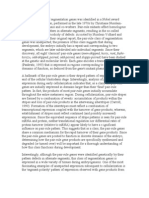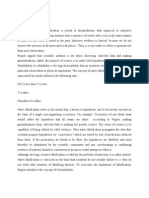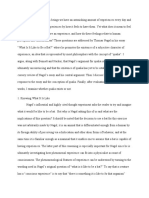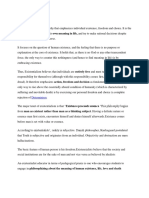EXISTENSIALISM
EXISTENSIALISM
Uploaded by
Sheena Tiangha LedesmaCopyright:
Available Formats
EXISTENSIALISM
EXISTENSIALISM
Uploaded by
Sheena Tiangha LedesmaCopyright
Available Formats
Share this document
Did you find this document useful?
Is this content inappropriate?
Copyright:
Available Formats
EXISTENSIALISM
EXISTENSIALISM
Uploaded by
Sheena Tiangha LedesmaCopyright:
Available Formats
One of the newer arrivals on the philosophic scene. 20th century product.
Closely related to literature and arts Deeply concerned with the emotions of individuals Individualism is the central pillar
American existentialist Introduced Existentialism from
Dosteovsky to Sartre existentialism is not a philosophy but a label for several widely different revolts against traditional philosophy. Most of the living existentialist have repudiated this label, and a bewildered outsider might well conclude that the only thing they have in common is a marked aversion of each other.
1. 2. 3.
The refusal to belong to any school of thought Repudiation of the adequacy of philosophic systems and bodies of belief Marked dissatisfaction with traditional philosophy as superficial, academic, and remote from life
Revitalized Christianity from within by uplifting the place of the individual and the role of personal choice and commitment
Denounced christianity, declare the death of God, uplifted his version of the superman
Karl Jaspers Gabriel Marcel Martin Heidegger Jean-Paul Sartre Albert Camus
Martin Buber Maxine Greene George Kneeler Van Cleve Morris
Individual existence is the focal point of existentialisms view of reality One way to look at the metaphysical foundation of existentialism is to contrast it with the Neo-Scholastic dictum that essence precedes existence in relation to time
Some neoscholastics have looked upon God as the creator of all things---including people. When God made humans, they claim, He had the idea of humanity (its essence) in mind before actually creating any persons
Who am I? What is the meaning of existence?
As an individual goes through life, he or she makes choices and develops
preferences and dislikes. It is through this activity that persons define who they are as individuals. Through this process a person comes to the realization that he or she is what he or she chooses to be.
Surrender the individuals authenticity to a logical system Christians leans on God Realist looks to nature for meaning Pragmatist relies on the community
If man as the existentialist conceives him, is indefinable, it is because at first he is nothing. Only afterward will he be something, and he himself will have made what he will be. Thus, there is no human nature, since there is no God to conceive it. Not only is man what he conceives himself to be, but he is also only what he wills himself to be after this thrust toward existence. Man is nothing else but what he makes of himself. Such is the first principle of existentialism.
Individual is the center of epistemological authority in existentialism Meaning and truth are built into the universe. Rather, it is the individual who gives meaning to such things as nature All knowing resides in the individual self, and it is the self that makes the ultimate decision as to what is true Truth therefore, can be seen in terms of existential choice, which is based upon the authority of the individual
Individual persons are not determinedthey are condemned to be free Because of this freedom, each person is responsible for his or her choices and actions Carl Rogers noted that individuals cannot rely on either the bible or the prophets, on Freud or research, or on the revelations of God or the decisions of other people Individuals have no excuse for their actions Each person has, in the idea of Sartre, no exit from his or her freedom and responsibility
Existentialists note that there is no tension after death, but that some people try to make their own lives like death by avoiding conflict at all cost Opposite of death is life Each individual is the supreme court in regard to what is beautiful No one can make decisions for other individuals
Education is nothing but propaganda served to a captive audience
1. 2.
3.
I am a choosing agent, unable to avoid choosing my way through life I am a free agent, absolutely free to set goals of my own life I am a responsible agent, personally accountable for my free choices as they revealed in how I live my life
Not be the one who is mainly concerned with the cognitive transference and who has the right answers Willing to help students explore possible answers Realize that no two students are alikeno two need exactly the same education Will seek to relate to every student in what Buber refers to as an IThou, rather than I-It, relationship Will the student as an individual with whom they can personally identify, rather than It that needs to be externally directed and filled with knowledge Facilitator Respect the emotional and irrational of individuals and will endeavor to lead students into better understanding of themselves
Indicates curricular flexibility as opposed to the traditional hierarchy of subjects in terms of importance basic subjects should be presented in relation to the students affective development rather than being isolated from individual meaning and purpose as they often are in traditional education Present a total view of humanity from both a positive and a negative perspective
Criteria of existentialist methodology center around the concepts of noncoerciveness and those methods that help each student to find and be himself or herself Existentialist are not generally concerned with the social policy of education or the school Philosophy lend itself to an emphasis on the individual rather than to the social aspects of human existence
You might also like
- Workbook For UPWDocument12 pagesWorkbook For UPWTarun Sharma100% (7)
- Ethics and Morality ModuleDocument44 pagesEthics and Morality Modulelemy83% (6)
- English 2Document2 pagesEnglish 2Earn8348No ratings yet
- Existence Precedes EssenceDocument3 pagesExistence Precedes EssenceSarthak AroraNo ratings yet
- Oral Report Experiment 2 DraftDocument20 pagesOral Report Experiment 2 DraftChristine Danica BiteraNo ratings yet
- Philosophy of Science Handout - The Problem of InductionDocument3 pagesPhilosophy of Science Handout - The Problem of InductionKinez72No ratings yet
- Immanuel KantDocument33 pagesImmanuel KantStacy Shara Cabusas OtazaNo ratings yet
- Fertilization and Maturation: Exercise 2Document19 pagesFertilization and Maturation: Exercise 2Abi Garcia100% (1)
- Experiment # 2: Kinematics of Human MotionDocument7 pagesExperiment # 2: Kinematics of Human MotionToni Andrei CervalesNo ratings yet
- Critique On Thomas Nagel'sDocument10 pagesCritique On Thomas Nagel'sMandip Jung SibakotiNo ratings yet
- Experiment 2: Kinematics of Human MotionDocument5 pagesExperiment 2: Kinematics of Human MotionKat DinoNo ratings yet
- Understanding ExistentialismDocument9 pagesUnderstanding ExistentialismAnimeshNo ratings yet
- Bibliography and References: Presented by Baby Lyn Oamil-Eusebio, LPTDocument23 pagesBibliography and References: Presented by Baby Lyn Oamil-Eusebio, LPTBaby Lyn Oamil EusebioNo ratings yet
- Materials and Methods A. Determination of Water PotentialDocument4 pagesMaterials and Methods A. Determination of Water PotentialIvy CruzNo ratings yet
- Ex 2 CmblabDocument31 pagesEx 2 CmblabrexartoozNo ratings yet
- The PairDocument3 pagesThe PairYogesh VyasNo ratings yet
- 10 Tips To Improve Your Pipetting TechniqueDocument1 page10 Tips To Improve Your Pipetting TechniqueMihai IonitaNo ratings yet
- 01 Mind-Body SummaryDocument5 pages01 Mind-Body SummaryAbdulrahim Sheikh TrabNo ratings yet
- Thoughts On Why, How and What Buddhists Can Learn From Christian TheologiansDocument15 pagesThoughts On Why, How and What Buddhists Can Learn From Christian Theologiansdsd8gNo ratings yet
- Naïve Falsification:: Vasundhara Savarikar Philosophy of ScienceDocument6 pagesNaïve Falsification:: Vasundhara Savarikar Philosophy of ScienceVasundhara KarkareNo ratings yet
- Free Will Vs DeterminismDocument4 pagesFree Will Vs DeterminismAhsas Sharma100% (1)
- Point of ViewDocument5 pagesPoint of ViewCarlos FabianNo ratings yet
- On His Blindness: Type of Work and Year WrittenDocument5 pagesOn His Blindness: Type of Work and Year WrittenNoel Panna100% (1)
- Sandra Harding My Notes - FinalDocument6 pagesSandra Harding My Notes - FinalSamiksha RajoriaNo ratings yet
- Philosophy of Mind Essay 6Document7 pagesPhilosophy of Mind Essay 6domsiravoNo ratings yet
- TRANSPIRATIONDocument20 pagesTRANSPIRATIONMelanie LaureanoNo ratings yet
- African Chinese Literature Kulang PaDocument3 pagesAfrican Chinese Literature Kulang PaCharllote PatsNo ratings yet
- The Three Parts of The SoulDocument4 pagesThe Three Parts of The SoulJon David RodriguezNo ratings yet
- Session 6 What Is The Meaning of LifeDocument34 pagesSession 6 What Is The Meaning of LifeShoaib Naeem100% (1)
- A Definition Is A Statement Which Explains What A Thing Is. It Is A Statement That Answers The Question "What Is This Thing?"Document18 pagesA Definition Is A Statement Which Explains What A Thing Is. It Is A Statement That Answers The Question "What Is This Thing?"Patricia Ann GuetaNo ratings yet
- Moore (1951) - Some Problems of Comparative PhilosophyDocument5 pagesMoore (1951) - Some Problems of Comparative PhilosophyJay-an CastillonNo ratings yet
- Rules For Naming Ionic Compounds Containing Polyatomic IonsDocument2 pagesRules For Naming Ionic Compounds Containing Polyatomic Ionsrotsacreijav77777No ratings yet
- Critique of Berkeley On AbstractionDocument42 pagesCritique of Berkeley On AbstractionPaul HorriganNo ratings yet
- Found in Translation - by David Hoon Kim - The New York Review of BooksDocument5 pagesFound in Translation - by David Hoon Kim - The New York Review of BooksMateo100% (1)
- Dolphijn Van Der Tuin - 2013 - New MaterialismDocument201 pagesDolphijn Van Der Tuin - 2013 - New MaterialismMalen AzulNo ratings yet
- Realism in Sylvia Plath's Novel The Bell Jar: Research PaperDocument4 pagesRealism in Sylvia Plath's Novel The Bell Jar: Research PaperMimi KeceNo ratings yet
- Literary CriticismDocument2 pagesLiterary CriticismJazzmin DulceNo ratings yet
- Aristotle's Generation and Corruption: A Study Guide and CommentaryDocument17 pagesAristotle's Generation and Corruption: A Study Guide and Commentarycamestres barocoNo ratings yet
- The First WayDocument19 pagesThe First WayPaul HorriganNo ratings yet
- Expt 5. CMB LabDocument11 pagesExpt 5. CMB Labememlamento1No ratings yet
- Savitri Summary JyotipriyaDocument5 pagesSavitri Summary Jyotipriyacostea0028100% (1)
- Goya SaturnDocument6 pagesGoya SaturnFabricio LopezNo ratings yet
- The Aunt's Story: by Patrick WhiteDocument14 pagesThe Aunt's Story: by Patrick WhiteMYKRISTIE JHO MENDEZNo ratings yet
- Critical Essay On Denise Levertov's Poem "Blue Rim of Memory"Document7 pagesCritical Essay On Denise Levertov's Poem "Blue Rim of Memory"Marjorie PartchNo ratings yet
- Experiment 2 FORMAL REPORTDocument6 pagesExperiment 2 FORMAL REPORTChristine Danica BiteraNo ratings yet
- Hume On TasteDocument25 pagesHume On TasteM Bilal SaeedNo ratings yet
- Philosophy of Truth and Non-ViolenceDocument6 pagesPhilosophy of Truth and Non-ViolenceAnonymous 59K293No ratings yet
- Spinoza's Theory of Scientia Intuitiva - Don GarrettDocument28 pagesSpinoza's Theory of Scientia Intuitiva - Don GarrettJGLNo ratings yet
- Oscar and LucindaDocument23 pagesOscar and LucindaNguyễn Vân Quỳnhh100% (1)
- René DescartesDocument24 pagesRené DescartesElleason Joshua G. FranciscoNo ratings yet
- Existential Struggles in Dostoevsky's The Brothers KaramazovDocument21 pagesExistential Struggles in Dostoevsky's The Brothers KaramazovSashikant ModiNo ratings yet
- Whitman and Background and Song of Myself For Nov 4Document3 pagesWhitman and Background and Song of Myself For Nov 4ChristinaNo ratings yet
- CMB Lab Expt 2Document4 pagesCMB Lab Expt 2Jovic PosadasNo ratings yet
- NaturalismDocument2 pagesNaturalismJimielyn MartinNo ratings yet
- Analysis of Human ActDocument11 pagesAnalysis of Human ActRossana AgustinNo ratings yet
- Readings On Karl PopperDocument20 pagesReadings On Karl Popperindubitably.No ratings yet
- Hamlet and The Cycle of Violence ResearchDocument10 pagesHamlet and The Cycle of Violence Researchapi-389741219No ratings yet
- Gattaca Sample EssayDocument4 pagesGattaca Sample Essaymissbellsstudents50% (2)
- CMB Lab Oral ReportDocument17 pagesCMB Lab Oral ReportKai ChenNo ratings yet
- Critical Analysis - Ako, Tipik Lamang Sa KagahaponDocument1 pageCritical Analysis - Ako, Tipik Lamang Sa KagahaponAq C YoyongNo ratings yet
- The Mind-Body ProblemDocument6 pagesThe Mind-Body ProblemCarlos Mendez PerezNo ratings yet
- EXISTENSIALISMDocument4 pagesEXISTENSIALISMMercyNo ratings yet
- A Critical Review of The Literature On Academic Self-Handicapping - Theory, Manifestations, Prevention and MeasurementDocument29 pagesA Critical Review of The Literature On Academic Self-Handicapping - Theory, Manifestations, Prevention and MeasurementYemima IreneNo ratings yet
- Sales Force MotivationDocument17 pagesSales Force MotivationJIGAR SHAHNo ratings yet
- Self Management SkillsDocument7 pagesSelf Management SkillsharshNo ratings yet
- Chapter 6Document38 pagesChapter 6priyamNo ratings yet
- Stress Management - How To Reduce, Prevent, and Cope With StressDocument4 pagesStress Management - How To Reduce, Prevent, and Cope With StressNaveen Kiran Manomayi Latha100% (1)
- Chapter 3 - PerceptionDocument2 pagesChapter 3 - PerceptionAlleinad GutierrezNo ratings yet
- Power of Subconscious (ENG)Document2 pagesPower of Subconscious (ENG)Rafael CarvalhoNo ratings yet
- 1 SELF - PHILOSOPHY PART 2Document34 pages1 SELF - PHILOSOPHY PART 2AngelikaNo ratings yet
- Philosophy ReviewerDocument4 pagesPhilosophy ReviewerMedel ChristyNo ratings yet
- CH 1 AP Psychology History of Psychology-1Document30 pagesCH 1 AP Psychology History of Psychology-1SNOWNo ratings yet
- A Seminar On Group DynamicsDocument13 pagesA Seminar On Group DynamicsSyed Razi Quadri0% (1)
- Six Step ReframeDocument4 pagesSix Step ReframeAnonymous PkeI8e84Rs100% (1)
- Emotional DevelopmentDocument21 pagesEmotional DevelopmentjhonaNo ratings yet
- Sharing Tacit KnowledgeDocument15 pagesSharing Tacit KnowledgeVishnu Prasad100% (1)
- LEADS LeadSelf ExecutiveSummary EN 2 PDFDocument3 pagesLEADS LeadSelf ExecutiveSummary EN 2 PDFSaran SaraNo ratings yet
- Love Attitude ScaleDocument1 pageLove Attitude ScaleLeMcCaps0% (1)
- Conflict Management in OBDocument23 pagesConflict Management in OBNaveen RajputNo ratings yet
- Agreeableness (Psychology)Document1 pageAgreeableness (Psychology)Shanice Del RosarioNo ratings yet
- Making Love StayDocument237 pagesMaking Love Staymoy moyNo ratings yet
- Master Plan of Group DyDocument9 pagesMaster Plan of Group DyValarmathiNo ratings yet
- Module 3 - The Reaction Paper Review and CritiqueDocument27 pagesModule 3 - The Reaction Paper Review and CritiqueStacy Anne LucidoNo ratings yet
- Unit 5 Theories of LearningDocument29 pagesUnit 5 Theories of LearningchefshibaniNo ratings yet
- The Ego-Soul Dynamics of Enlightenment: by Richard Barrett, Chairman and Founder, Barrett Values CentreDocument9 pagesThe Ego-Soul Dynamics of Enlightenment: by Richard Barrett, Chairman and Founder, Barrett Values CentreAmi LengadeNo ratings yet
- SCARF NeuroleadershipArticleDocument10 pagesSCARF NeuroleadershipArticleJay Roth100% (4)
- Karen HorneyDocument7 pagesKaren HorneyTony KayalaNo ratings yet
- Executive SummaryDocument5 pagesExecutive SummaryRobert GarlandNo ratings yet
- Psychedelic Therapy As Reality Transformation: A Phenomenological ApproachDocument12 pagesPsychedelic Therapy As Reality Transformation: A Phenomenological Approachtimasanz petrementNo ratings yet
- Psychosynthesis Magazine - N. 30 October 2018Document41 pagesPsychosynthesis Magazine - N. 30 October 2018istituto_psicosintesi100% (1)

























































































